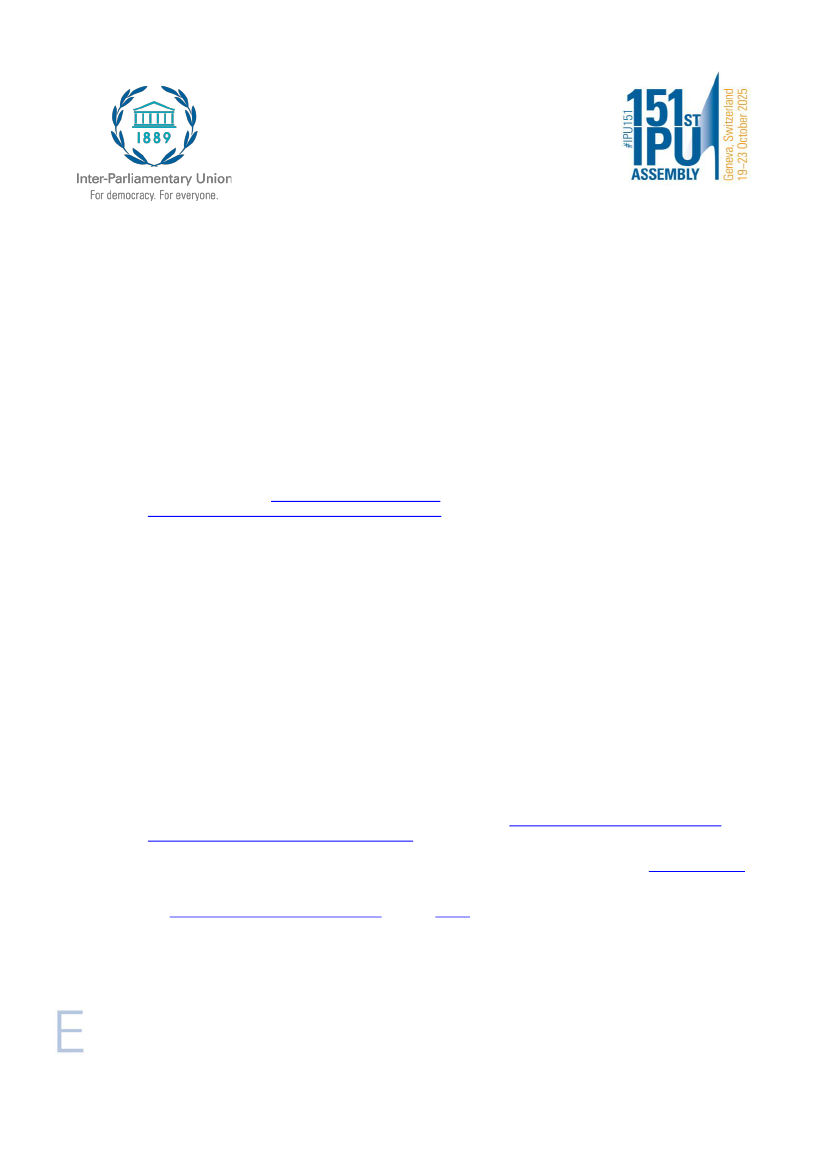
151st IPU Assembly
Geneva
19–23 October 2025
Assembly
Item 3
A/151/3-Inf.1
29 July 2025
Concept note for the General Debate
Upholding humanitarian norms and supporting
humanitarian action in times of crisis
The world today is marked by increasing rates of violence involving State and non-State actors, across
multiple regions. In 2025, more than 120 armed conflicts are in progress: some have only recently
begun, while others have been ongoing for more than 50 years. In an era marked by protracted armed
conflicts, a combination of factors, such as escalating armed violence, forced displacement, climate
change, public health emergencies, food insecurity and gender-based violence, has exacerbated
humanitarian needs.
More than 122 million people
are considered forcibly displaced today, while almost
310 million are in need of humanitarian assistance.
Among these, women and girls are disproportionately
affected: every day, 500 women and girls in crisis settings die from preventable causes related to
pregnancy, and women and girls account for 60% of those facing food insecurity.
The Geneva Conventions were concluded in 1949 as a multilateral response to the horrors of the
Second World War. This was a collective effort by States aiming to protect those most vulnerable to
armed conflict and, thus, to limit its effects. The Geneva Conventions are at the heart of
international
humanitarian law
(IHL). Recent developments have, however, shed light on the current multilateral
system’s difficulty in providing responses to major humanitarian challenges and to the suffering caused
by contemporary armed conflicts. Growing nationalism, geopolitical fragmentation and mistrust in
international institutions have severely impacted the global humanitarian landscape.
Humanitarian action,
understood as the sum of all activities aimed at protecting and bringing relief to people affected by crises,
disasters or conflicts, has been heavily jeopardized. The recent funding cuts to humanitarian aid globally
have left the humanitarian system at a breaking point, with many of those in need of assistance at risk of
losing their lives. At the same time, even the most fundamental humanitarian norms are being challenged
in today’s warzones. Not even medical and relief personnel and facilities have been spared from attacks.
International cooperation to address these global challenges has never been more important. Upholding
humanitarian norms and supporting humanitarian action are goals which can only be achieved through a
collective effort aimed at bridging divides and reinforcing multilateral engagement. With this in mind, the
International Committee of the Red Cross launched in 2024 a
Global Initiative to galvanise political
commitment to international humanitarian law
with the goal of developing, over the next two years, a set
of concrete and actionable recommendations to ensure that IHL is not only better respected but adapted
for the future. In the same spirit, the UN Secretary-General launched, in June 2025, a
global campaign
to
uphold the norms of humanitarian disarmament and strengthen mine action with the goal of re-energizing
public support for disarmament and facilitating concrete actions by States in this area. At the launch of
the
Global Humanitarian Overview 2025,
he also
called
on States to recognize the need for a surge not
only of funding for humanitarian aid, but also of political will to ensure adherence to IHL. This surge is
multisectoral and requires investment across areas such as sustainable development, peacebuilding,
human rights, health, climate action, science, technology, gender equality and youth empowerment.
Looking at the interlinkages between the lack of adherence to humanitarian norms and the lack of
support for humanitarian action on the one hand, and broader political, social and developmental
challenges on the other is at the heart of efforts to strengthen today’s humanitarian system and global
action.
#IPU151